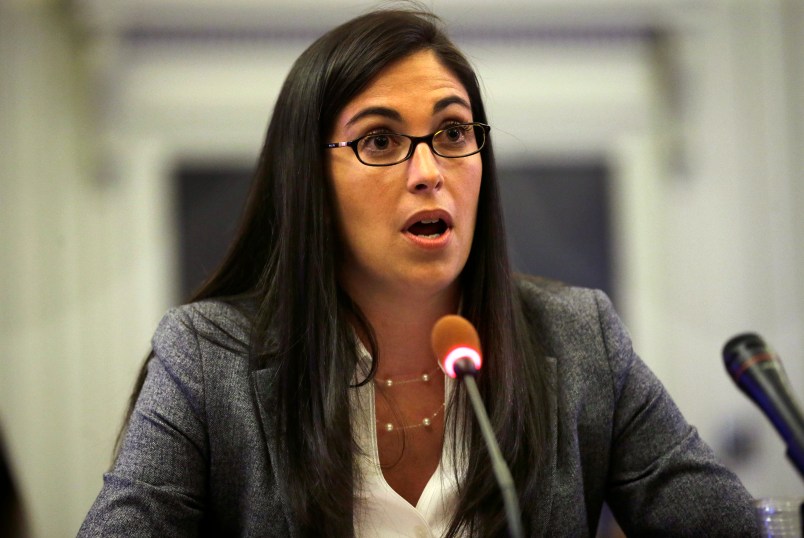Testimony given Tuesday by a former member of New Jersey Gov. Chris Christie’s administration raised more questions about a report clearing Christie of any involvement in the George Washington Bridge scandal.
The legislative committee investigating the scandal heard Tuesday from Christina Renna, who worked in the governor’s Office of Legislative and Intergovernmental Affairs, known as IGA. In her role, Renna worked under both Bill Stepien, who left the office in 2013 to run Christie’s re-election campaign, and Bridget Kelly, who succeeded Stepien and who is the administration figure most closely tied to the plan to close Fort Lee, N.J.’s access lanes to the bridge in September.
During her testimony, Renna was asked by state Sen. Loretta Weinberg (D), one of the committee’s co-chairs, about an interview conducted by lawyers from the firm of Gibson, Dunn & Crutcher, which was hired to represent Christie’s office and do an internal review of the scandal. The law firm released a report of their findings earlier this year, clearing Christie. Last month, the firm also made public “summaries” of the interviews it conducted with 75 witnesses. On Tuesday, Weinberg asked Renna about the following passage included in the legal team’s summary of her interview:
Renna believed Stepien kept track of mayors who were not in favor with IGA, but Renna was not privy to that process. But IGA staff would receive mandatory directives along the lines of “do not rush to return this mayor’s phone call.” Renna recalled an IGA staffer asking Renna, “Can we get a list of hands-off mayors?” Renna remembered responding, “You know we won’t get it, and it would change daily anyway.”
But Renna said she had problems with the language used in the document.
“‘Mandatory directive’ were not my words,” Renna said. “If you notice, they are not in quotation marks. That was Gibson Dunn’s words. That was their characterization. They are never words I would have used. I would never use ‘mandatory directive,’ except in one incident which we can circle back to. They were not my words.”
Weinberg asked Renna whether she had a chance to correct Gibson Dunn’s characterization of her interview before it was released publicly.
Renna replied that she had not been given the opportunity.
“There are minor facts in my interview throughout it that are just, you know — there are some inaccuracies,” she said.
Weinberg asked for examples.
“For example, there are 60 Sandy-affected towns, not 16,” Renna said. “An important error in the report was this ‘mandatory directive,’ has gotten a lot of attention, and is upsetting to me, because it was not my characterization at all, nor would it be. The phone call I exchanged with Bridget Kelly on Dec. 12. You know, she called me, I called her back. The call dropped mid-conversation. We tired to call each other back, I actually reached her first, not vice versa. So little details like that, for example. But mandatory directive is the one that candidly was most alarming to me, because its aggressive language, and its not language I would have used.”
A few minutes later, Renna was asked by Assemblyman John Wisniewski (D), the committee’s other co-chair, about the paragraph passage from the interview summary.
“We did not receive mandatory directives. I’m correcting this language,” Renna said.
According to Gibson Dunn, the firm’s lawyers interviewed Renna on Jan. 30. At the top of the summary it released last month, which the firm refers to as an “interview memorandum,” the firm makes clear that the document “does not contain a verbatim transcript of what was said at the meeting; rather, it is a summary of the discussion that reflects counsel’s mental thoughts and impressions.” The report that was produced using Renna and the other witnesses’ interviews left numerous questions central to the scandal unanswered, and the lawyers who conducted it were unable to interview most of the people who are publicly understood to be central to the scandal. Christie’s opponents have gone as far as calling the report a “whitewash.”
At the top of her testimony on Tuesday, Renna read a statement saying that she had no knowledge of or involvement with the lane closures.
Christie’s office did not immediately respond to a request for comment from TPM.







“It’s the coverup that gets you.”
Skank Wanker’s Christina Renna is out. Just have to find `em.
Chris Christie’s innocence in bridge-gate is one giant “inaccuracy” in that taxpayer-funded million dollar whitewash report.
No different than the million dollar funded investigations and endless hours MSNBC has spent on a story about a couple lanes of traffic being closed.
“Ex-Aide: Christie’s Self-Exoneration Is Full Of Holes”
It’s full of something, that’s for sure…